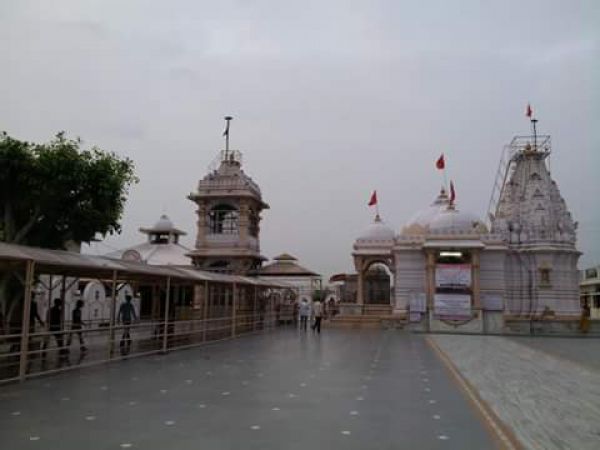The village of Rupaal in North Gujarat is not exactly a land of milk and honey, but at least for one night every year, the final night of Navaratri, it becomes a land of pure ghee. This village of 7,000 has a unique way of thanking its resident Goddess Vardayani, whose temple stands in the village square.
Along with the residents of the village, over a lakh and a half devotees of the goddess converge at Rupaal on the ninth night of Navaratri to pour ghee over five earthen lamps that dot a wooden structure called the palli. A pyramid-like structure made from the wood of Prosopis cineraria, also called the Sami Vriksha, the palli is taken in a procession through the 27 thoroughfares of the village. And at every thoroughfare ghee is poured over the lamps by the devotees.
While the offering of ghee in temple rituals is nothing unusual, what sets Rupaal’s palli festival apart from the rest is the sheer quantity of ghee used – nearly 25,000 kg of it, worth over Rs 30 lakh. While some of it gets consumed, most of the ghee just flows down the streets of Rupaal.
Among those who come here are those seeking divine blessings as well as people wishing to express gratitude for wishes that have come true. Ramanlal Patel believes his business has benefited from his faith, and arrives at Rupaal every year to pour 51 tins of ghee over the palli.
Another grateful devotee is Sunil Shah, an Ahmedabad-based businessman. He and his wife had been childless even after 10 years of marriage when, a couple of years ago, they were advised to visit Rupaal.
When they had a son within a year, the Shahs’ faith in Vardayani grew. In fact, childless couples such as the Shahs form a majority among those who come to Rupaal for the palli festival. Shah is convinced of the goddess’ powers: “Those who are not aware about the prowess of the Mata might dub this as blind faith. But not people like me who have experienced her powers.”
So strong is the believers’ faith that it has given rise to many stories about the festival. One concerns the move, soon after Independence, of the then Bombay Presidency government to prevent the waste of ghee during the festival by deploying police in the village on the day of the procession.
According to the older residents, the official who was supposed to carry out the government’s order was suddenly hit by a bout of diarrhoea. Says Himmatbhai Patel, who claims to be a witness to the incident: “The official soon realised his folly, and not only allowed the procession to proceed, but also poured ghee over the palli himself to atone for his sin.”
Villagers maintain the festival has been observed since the time of the Mahabharata. The five lamps on the palli are associated with the five Pandavas, who were supposed to have visited Rupaal in the last year of their exile during which they were hiding their identity. Folklore has it that the Pandavas came to Rupaal, which was then a part of the legendary forest of the demon Hidimba, looking for a place to hide their weapons.
There, they invoked Goddess Vardayani and then hid their weapons in the bushes of the Sami Vriksha, before moving on to spend the rest of their exile in hiding. After the Pandavas completed their 13th year without being recognised by anyone, they returned to Rupaal to collect their weapons.
It was during this visit that they installed the image of Vardayani in a temple and celebrated their success. Thus was born the palli festival. However, no one knows how the use of ghee came to be a part of the festival.
Folklore has it that the Pandavas installed the idol of the goddess at the end of their 13-year exile.
The palli festival is also a powerful symbol of social integration, involving the participation of all communities from the Patels, Brahmins and Banias to the Muslims. Says Govindbhai Patel, a senior forest department official from Rupaal: “The caste system has never come in the way of the palli yatra.”
As the organisers of the procession help jostling devotees empty hundreds of tins of ghee over the palli, they can take heart from the fact that they are helping to make the road towards social amity that much smoother.
Agencies
